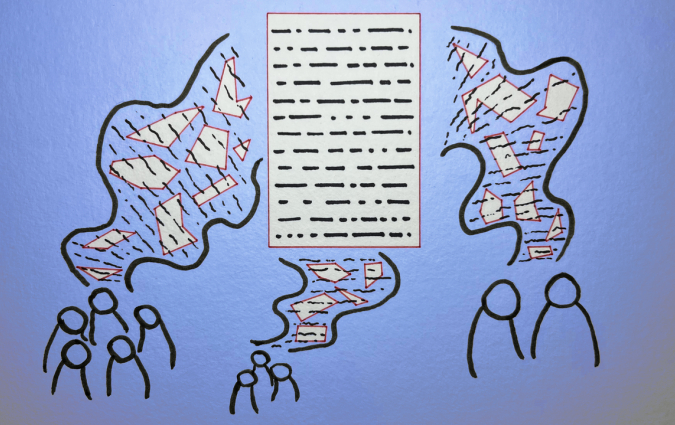Here are the APSA 2024 talks featuring researchers from the Reuters Institute

The 120th Annual Meeting & Exhibition of the American Political Science Association takes place in Philadelphia, USA, this week. Some of our researchers will be presenting papers on trust in news, interest in news, WhatsApp and misinformation, and the impact of news consumption on attitudes to climate protests. See the abstracts below.
News Use and Attitudes Towards Direct Action Climate Protests: A Comparative Study of the UK, US, France, and Germany
Saturday 7 September, 14:00-15:30, Marriott Philadelphia Downtown, Franklin 3
In response to widespread inaction, climate activists have increasingly employed disruptive yet peaceful protest tactics to capture public and media attention. While these protests succeed in drawing attention, they often spark contentious debates in the news media, which can shape public support—an area that remains underexplored. To investigate how media consumption—mainstream versus non-mainstream—and the credibility of information sources influence public support for these protests, we conducted a survey across four countries: the United States, United Kingdom, Germany, and France (n = 4,334). Findings reveal that mainstream media consumption negatively impacts support for these protests, while non-mainstream media has a positive but not significant effect. Notably, exposure to scientific sources increases support, whereas government and celebrity sources reduce it. The study highlights the complex relationship between media, source credibility, and public opinion, offering insights for those seeking to foster greater public engagement in climate action.
Political Communication > Media, Protest and Violence
To Forward or Not to Forward? The Effect of WhatsApp Labels on Misinformation
Saturday 7 September, 16:00-17:30, Marriott Philadelphia Downtown, Franklin 4
The consumption and dissemination of false or misleading information on closed messaging apps like WhatsApp is an urgent issue, given its global popularity. To tackle this, social networks like WhatsApp have introduced labels for forwarded content to warn users and curb the spread of unverified information. In a pre-registered online survey experiment conducted in the UK in 2022 (N = 1250, Prolific), we tested the impact of “Forwarded” and “Forwarded many times” labels on the perceived accuracy and likelihood of sharing false and true posts. Our findings suggest that WhatsApp labels decrease the likelihood of sharing posts, including posts that include accurate information, particularly in posts labelled as 'Forwarded many times.' Participants were randomly assigned to one of three conditions: No labels (control group with no labels shown), “Forwarded” labels (posts with labels shown), or “Forwarded many times” labels (posts with labels indicating multiple forwards). We presented all participants with six real posts sourced from fact-checkers and news organisations in the UK, including FullFact and Reuters. Four of these posts had been fact-checked and found false or misleading, while two contained accurate information on MPox. However, most of these effects appear small and occasionally statistically insignificant, highlighting the need for further research, particularly in countries where WhatsApp is popular for political news.
Political Communication > The Online and Offline Effect of Misinformation
A Qualitative Analysis of the Mechanisms Underlying the “Trust Nexus”
Sunday 8 September, 08:00-9:30, Marriott Philadelphia Downtown, 411
Amy Ross Arguedas, Sayan Banerjee, Camila Mont’Alverne, Benjamin Toff, Richard Fletcher, Rasmus Kleis Nielsen
A growing body of work has found evidence of a strong “nexus” between public trust in political institutions and the press in general. While studies have proposed various explanations for this correlation, research examining how audiences think about the relationship between journalism and politics is limited. Furthermore, this association contradicts understandings of journalism as having an adversarial relationship with politicians, an ideal held by journalists and often supported by studies examining the relationship between politicians and journalists. In this paper, we expand our understanding of the trust nexus, drawing on three rounds of qualitative data collection in four countries: Brazil, India the United Kingdom, and the United States. We find evidence supporting that the trust nexus is sustained through both implicit and explicit connections people make between politics and news. On the one hand, participants (1) often conflated news and politics when talking about either and (2) described politicians and journalists in similar kinds of ways, at times categorising both as powerful elites, suggesting some of this linkage may be happening at an unconscious level. On the other hand, many participants also espoused more explicit beliefs or “folk theories” about (3) journalists and politicians working together in a relationship collusion; (4) journalists working for politicians in a relationship of subservience; (5) journalists working on their own behalf, as powerful political actors in their own right, actively participating—or interfering—in political life.
Political Communication > The Drivers and Variation of Media Trust and Distrust September
Changing Levels of Interest in News and Politics in the Last Decade
Sunday 8 September, 08:00-9:30, Marriott Philadelphia Downtown, 411
Richard Fletcher, Waqas Ejaz, Rasmus Kleis Nielsen
Individual motivation—often studied in terms of ‘interest’—is typically seen as the primary reason for why some people choose to engage with news and politics. Using nine years of YouGov survey data (2015-2023) from 46 countries and around 650,000 respondents, we explore changes to interest in news and interest in politics over time. We find that (i) there has been a significant overall decline in both interest in news and interest in politics since 2015, and (ii) are evident in almost all countries studied. At the individual level, (iii) both interest in news and interest in politics is higher among older people, men, those with a university education, political partisans, and those with higher trust in news—and that these associations are very consistent across countries. At the societal level, we find that (iv) declining trust in news, increasing platformisation of news, and changing levels of partisanship are associated with lower interest. Our findings highlight important changes to people’s motivation to engage with news and politics, and help us understand emerging trends such as rising news avoidance. They also suggest that changes to the news media environment may be important for understanding changes to interest over time.
Political Communication > The Drivers and Variations of Media Trust and Distrust
Find more details about these talks and about APSA on the conference website below.
In every email we send you'll find original reporting, evidence-based insights, online seminars and readings curated from 100s of sources - all in 5 minutes.
- Twice a week
- More than 20,000 people receive it
- Unsubscribe any time





